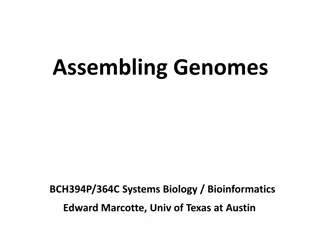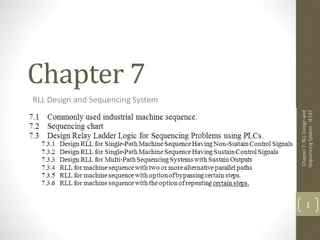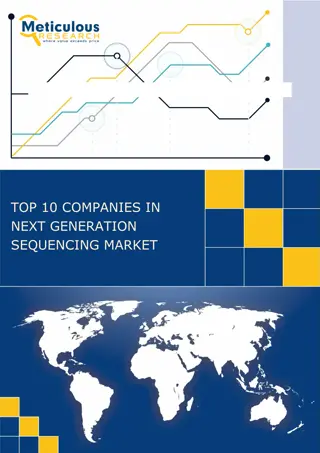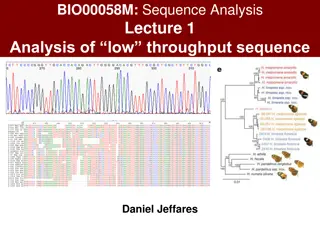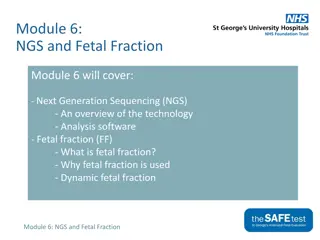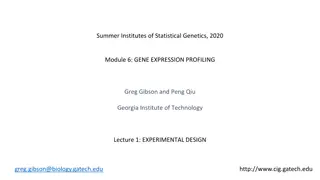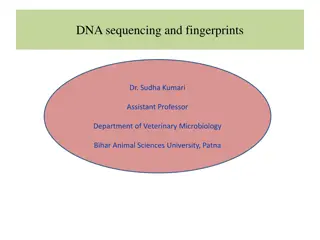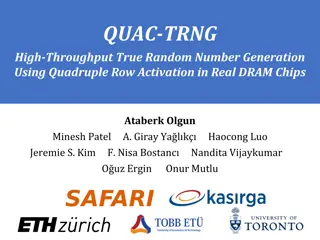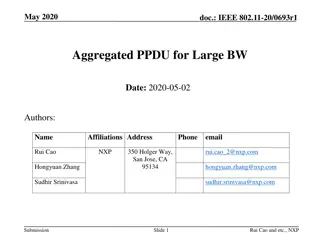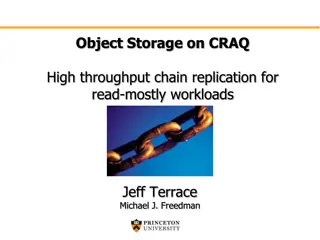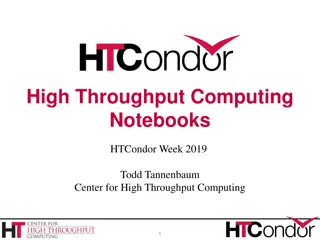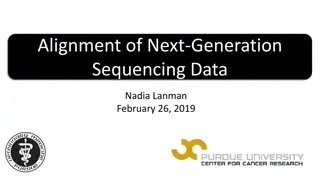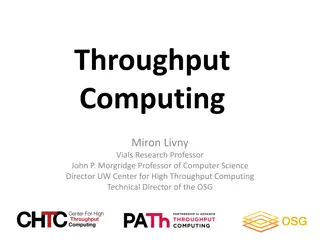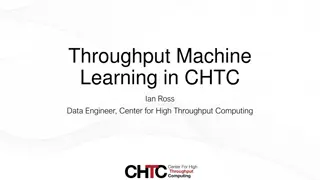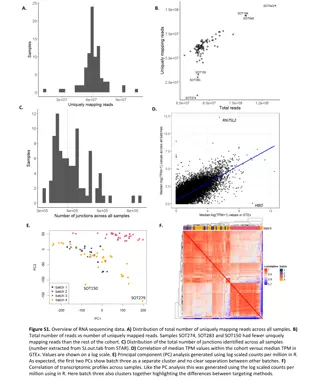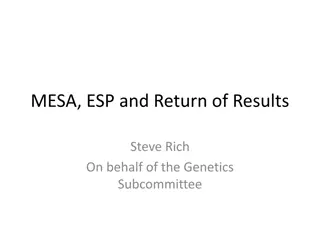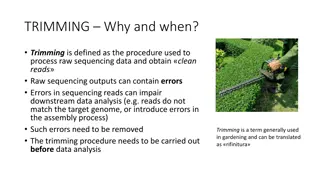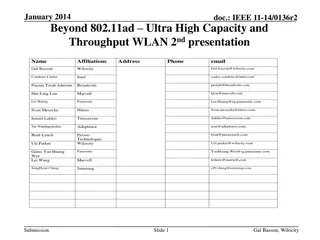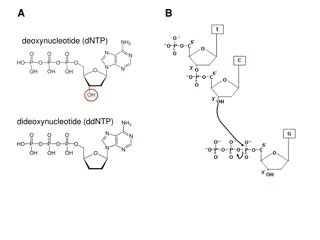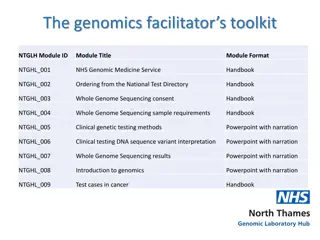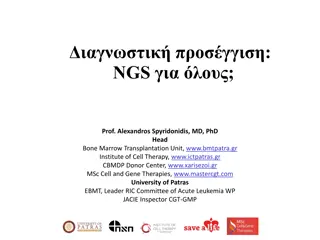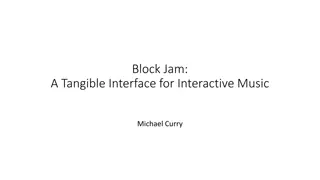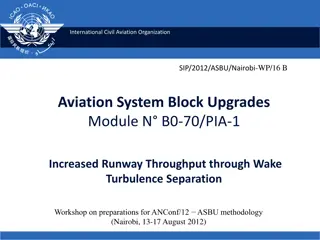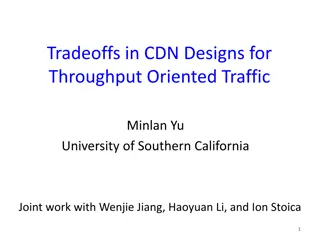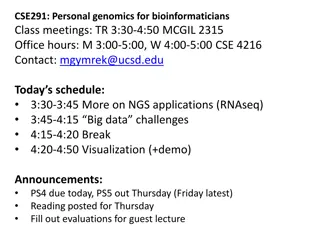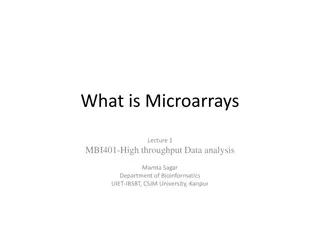Insights into Genome Assembly and Shotgun Sequencing
Explore the world of genome assembly, shotgun sequencing, and the fundamental concepts behind deriving genomes from large sets of sequencing reads. Learn about the complexity and core algorithms involved in contemporary genome assembly processes. Discover how the shotgun concept has revolutionized g
2 views • 66 slides
RLL Design and Sequencing System Overview
Common industrial sequences in RLL design and sequencing systems involve single path or multi-path approaches. Control signals can be sustain or non-sustain, impacting the system's memory. Sequence charts help visualize system operations, aiding in RLL design. Techniques like the CASCADE method are
13 views • 24 slides
NEXT GENERATION SEQUENCING MARKET
Explore $27.5 billion next generation sequencing market: Get exclusive insights on key market trends, segments, geographical analysis, & competitive analysis!\n
1 views • 5 slides
Asia-Pacific Next Generation Sequencing Market
Meticulous Research\u00ae\u2013 a leading global market research company, published a research report titled \n\"Asia-Pacific Next Generation Sequencing (NGS) Market by Offering (Kits [Library Prep, QC, DNA Extraction],\n System) Type (Genome, Exome, Targeted) Application (Reproductive, Oncology) Te
1 views • 3 slides
Next Generation Sequencing Market in Asia-Pacific Aiming for $6.38 Billion Miles
Meticulous Research\u00ae\u2013 a leading global market research company, published a research report titled\n \"Asia-Pacific Next Generation Sequencing (NGS) Market by Offering (Kits [Library Prep, QC, DNA \nExtraction], System) Type (Genome, Exome, Targeted) Application (Reproductive, Oncology) Te
0 views • 3 slides
Transformative Power of Sequencing in Molecular Biology
The falling costs of sequencing have revolutionized various fields like genetics, genomics, cell biology, microbiology, and evolutionary biology. Sequencing data has enabled us to understand genomes, revolutionize cell biology techniques, conduct comparative genomics, population genomics, and metage
1 views • 31 slides
Understanding NGS and Fetal Fraction in Prenatal Screening
Next Generation Sequencing (NGS) plays a key role in prenatal testing by analyzing cell-free DNA (cfDNA) to determine fetal fraction and detect genetic anomalies like Down syndrome. The process involves DNA extraction, library construction, barcode labeling, sample pooling, quantification, and seque
0 views • 13 slides
Understanding Sanger Sequencing: A Step-by-Step Guide
Explore the detailed procedure of Sanger sequencing, from sample collection to DNA extraction, gene amplification, and sequencing preparation. Learn about the components involved, such as polymerase, nucleotides, and dideoxynucleotides, to achieve accurate DNA sequencing results. Follow the chain-te
3 views • 11 slides
Gene Expression Profiling in Statistical Genetics Summer Institute 2020
This content provides information on the Summer Institutes of Statistical Genetics module, focusing on gene expression profiling. It includes details on the schedule, experimental design, RNA sequencing workflow, modes of bulk RNA sequencing, and RNASeq software. The content discusses crucial steps
0 views • 11 slides
Understanding DNA Sequencing: Principles, Applications, and Techniques
DNA sequencing plays a vital role in various fields such as research, diagnostics, biotechnology, forensics, and biological systematics. By determining the order of nucleotide bases in a DNA molecule, it helps in understanding genetic sequences, identifying mutations, and completing projects like th
0 views • 17 slides
High-Throughput True Random Number Generation Using QUAC-TRNG
DRAM-based QUAC-TRNG provides high-throughput and low-latency true random number generation by utilizing commodity DRAM devices. By employing Quadruple Row Activation (QUAC), this method outperforms existing TRNGs, achieving a 15.08x improvement in throughput and passing all 15 NIST randomness tests
0 views • 10 slides
Strategies and Tactics in Mediation Sequencing Models
Negotiators and mediators employ various sequencing strategies and tactics to effectively manage complex social conflicts. Sequencing strategies outline the overall plan for addressing issues, while tactics consist of specific actions to achieve desired outcomes. General sequencing models include Gr
0 views • 25 slides
Understanding Azure Cosmos DB Billing Components and Request Units
Azure Cosmos DB billing model consists of two main components - Consumed Storage and Provisioned Throughput. You are billed based on the storage consumption and provisioned throughput. Request Units (RUs) abstract physical resources for performing requests, with specific RU costs for different types
0 views • 13 slides
Patient Choice for Whole Genome Sequencing in NHS: Education & Training Slide Deck
Developed by Genomics Education Programme, these slides focus on the patient choice consent model for whole genome sequencing in NHS Genomic Medicine Service. The model aims to ensure informed choices for genomic testing, including participation in the National Genomic Research Library. It covers se
0 views • 34 slides
Enhancing Throughput with Aggregated PPDU for Large Bandwidth IEEE 802.11 Networks
This document discusses the implementation of Aggregated PPDU to boost throughput in IEEE 802.11 networks with large bandwidth. The focus is on accommodating various STAs with different operating bandwidths and optimizing traffic flow. By utilizing Aggregated PPDU, significant gains in throughput ca
5 views • 7 slides
Understanding Chain Replication for High Throughput Object Storage
Chain replication is a technique used to achieve high throughput and scalability in object storage systems. It ensures strong consistency by maintaining replicas of data across a chain of nodes, enabling efficient read-mostly workloads. The approach simplifies programming complexity and enhances sys
0 views • 28 slides
Efficient Data Management Strategies for High-Throughput Systems
This content discusses the use of Log-Structured Merge Trees (LSMs) and Bloom Filters in cloud infrastructure to manage high-throughput updates efficiently. It explores strategies such as collecting and batching updates in memory, spilling data from memory to disk, and merging in-memory and on-disk
1 views • 18 slides
Introduction to High Throughput Computing Notebooks with HTCondor
Explore the world of high throughput computing through Jupyter Notebooks, capable of running on laptops or remote servers. Learn to set up personal HTCondor pools, utilize Python bindings, and integrate with JupyterHub for efficient scientific computing.
0 views • 16 slides
Understanding Blockchain Scaling: Throughput Enhancement Strategies
Explore the concept of scaling throughput in blockchain technology through a detailed analysis of Bitcoin and Ethereum performance, limitations in throughput, security implications related to forking, and innovative solutions like GHOST protocol to enhance network efficiency and security.
0 views • 18 slides
Understanding Sequence Alignment in Next-Generation Sequencing Data
Sequence alignment plays a crucial role in analyzing Next-Generation Sequencing (NGS) data by identifying similarities between DNA, RNA, or protein sequences. Global and local alignment methods are used to arrange sequences and locate fragments derived from specific genes or transcripts. Challenges
0 views • 31 slides
Advancing High Throughput Computing: A Revolution in Job Handling
Explore the evolution of High Throughput Computing (HTC) through milestones like the formation of the OSG Consortium and the Partnership to Advance Throughput Computing (PATh). Discover how the PATh project aims to innovate and expand Distributed HTC technologies for Science & Engineering goals. Div
0 views • 13 slides
Exploring Throughput Machine Learning in High-Throughput Computing
Explore the applications of Artificial Intelligence and Machine Learning in the context of High-Throughput Computing (CHTC). Learn about AI/ML methodologies, deep learning, data engineering, and their roles in enabling novel scientific advancements. Discover use cases, ongoing work, and future plans
0 views • 28 slides
Overview of RNA Sequencing Data: Insights from Transcriptomic Profiling
This data set presents key findings from RNA sequencing analysis, including distribution of mapped reads, junction identification, TPM correlation, principal component analysis, and gene expression effects. Visual representations illustrate differences in gene expression profiles across samples, emp
0 views • 6 slides
Genetics Subcommittee Report on MESA, ESP, and Return of Results
This report discusses the collaboration between MESA, ESP, and various consortia in sequencing exomes and analyzing variants in coding regions of genes. It highlights the impact of exome sequencing on scientific and personal levels, focusing on rare variants and potential clinical implications. The
0 views • 12 slides
Understanding the Importance of Trimming in Sequencing Data Processing
Trimming is a crucial procedure used to process raw sequencing data by removing errors such as low-quality bases and ambiguous nucleotides. This step is essential before downstream data analysis to ensure accurate results. Trimming involves setting quality thresholds to retain only high-confidence b
0 views • 10 slides
Beyond 802.11ad: Ultra High Capacity and Throughput WLAN
The document from January 2014 discusses the exploration of modifications to IEEE 802.11ad-2012 PHY and MAC layers to enable modes of operation in the 60 GHz band capable of achieving a maximum throughput of at least 30 Gbps while maintaining the band's excellent capacity attributes. Topics include
0 views • 21 slides
Understanding Sanger DNA Sequencing Procedure
Overview of Sanger (dideoxy) DNA sequencing, involving deoxynucleotides and dye-labeled dideoxynucleotides to image DNA band sizes. The simulation model includes steps like denaturing DNA, annealing primers, and synthesizing DNA chains using dNTPs and ddNTPs. The process culminates in electrophoresi
0 views • 7 slides
Enhancing Goodput with HTCSS and Adstash in High Throughput Computing
Explore how utilizing HTCSS and Adstash can boost goodput in high throughput computing environments. Learn about usage reporting with accounting ads, storing job history in Elasticsearch, and common challenges to overcome. Discover insights on CPU core hours delivery, GPU usage, memory analytics, us
0 views • 27 slides
Genomics Facilitator's Toolkit Summary & Sample Requirements
This toolkit provides essential resources for healthcare professionals involved in genomics services, covering topics such as genomic medicine, whole genome sequencing, clinical genetic testing methods, interpretation of DNA variants, and more. It also details the specific sample requirements for di
0 views • 24 slides
Next-Generation Sequencing in Clinical Practice: Advancements and Applications
Next-Generation Sequencing (NGS) has revolutionized genetic analysis in healthcare. Dr. Alexandros Spyridonidis, a renowned expert in the field, discusses the impact of NGS on diagnostics, prognostics, and personalized medicine. The technology allows for more comprehensive understanding of diseases
0 views • 38 slides
Block Jam: A Tangible Interface for Interactive Music
Block Jam, designed by Sony CSL in the early 2000s, is a tangible interface for sequencing music using functional units called Blocks. Users manipulate music through Blocks that connect to sequencing software, enabling easy music creation and encouraging cooperative musical experiences. User studies
0 views • 8 slides
Enhanced Runway Throughput via Wake Turbulence Separation Module N.B0-70
This document discusses Module N.B0-70 of the ASBU methodology by ICAO, focusing on increased runway throughput through revised wake turbulence separation standards and procedures. The module addresses the need for more efficient spacing and sequencing of aircraft during approach and en-route operat
0 views • 12 slides
Comparison of Economic Reform Sequencing in China
Andrew K. Rose from NUS Business School compares China's economic reform sequencing with the Washington Consensus. The optimal reform sequencing includes stabilization before reform, real before financial reform, and domestic before international reform. China's approach aligns oddly with the Washin
0 views • 14 slides
Understanding Sequencing Algorithms for Biological Sequences
Karla H. Hermann discusses specific algorithms for sequencing biological sequences, emphasizing the importance of clear experimental questions, good planning, and careful sample handling. Techniques such as RNA sequencing with gel beads and 10x Genomics software are highlighted. The process of picki
0 views • 15 slides
Tradeoffs in CDN Designs for Throughput-Oriented Traffic
Understanding the evolving nature of throughput-oriented traffic on the Internet is crucial as video content dominates consumer traffic. This study delves into identifying and addressing throughput bottlenecks at the client, network, and server levels. It emphasizes the importance of improving netwo
0 views • 27 slides
Understanding NGS Applications in Bioinformatics
Explore the world of Next-Generation Sequencing (NGS) applications in bioinformatics, covering topics such as RNA sequencing, big data challenges, storing genomic datasets, querying genetic information, and data visualization. Dive into the complexities of sequencing technologies, gene expression co
0 views • 41 slides
Exploring Bringing Your Own Capacity in High-Throughput Computing
Researchers are increasingly interested in accessing compute capacity outside of their usual systems in high-throughput computing. This exploration delves into the history, phases, and initial experiments of bringing external capacity to the Open Science Pool, detailing the process and challenges fa
0 views • 18 slides
Enhancing Wireless LAN Throughput with Multiple Primary Channels
This document discusses the need for increasing system throughput in wireless LAN networks due to the growing demand for WLAN traffic. By introducing multiple primary channels, unused resources scattered across various channels can be exploited to improve quality of service and enhance transmission
0 views • 20 slides
University of Wisconsin Biotechnology Center Overview
The University of Wisconsin Biotechnology Center (UWBC) is a leading institution employing approximately 60 faculty, staff, and students. Offering core facilities such as the Bioinformatics Resource Center and DNA Sequencing Core, UWBC provides services in next-gen sequencing data analysis, genome a
0 views • 12 slides
Introduction to Microarray Technology in Functional Genomics
Functional genomics involves analyzing large datasets from biological experiments, such as gene expression analysis using microarray technology. DNA arrays facilitate probing and quantifying nucleic acid species in solution. However, the use of microarrays is being replaced by high throughput sequen
0 views • 21 slides
